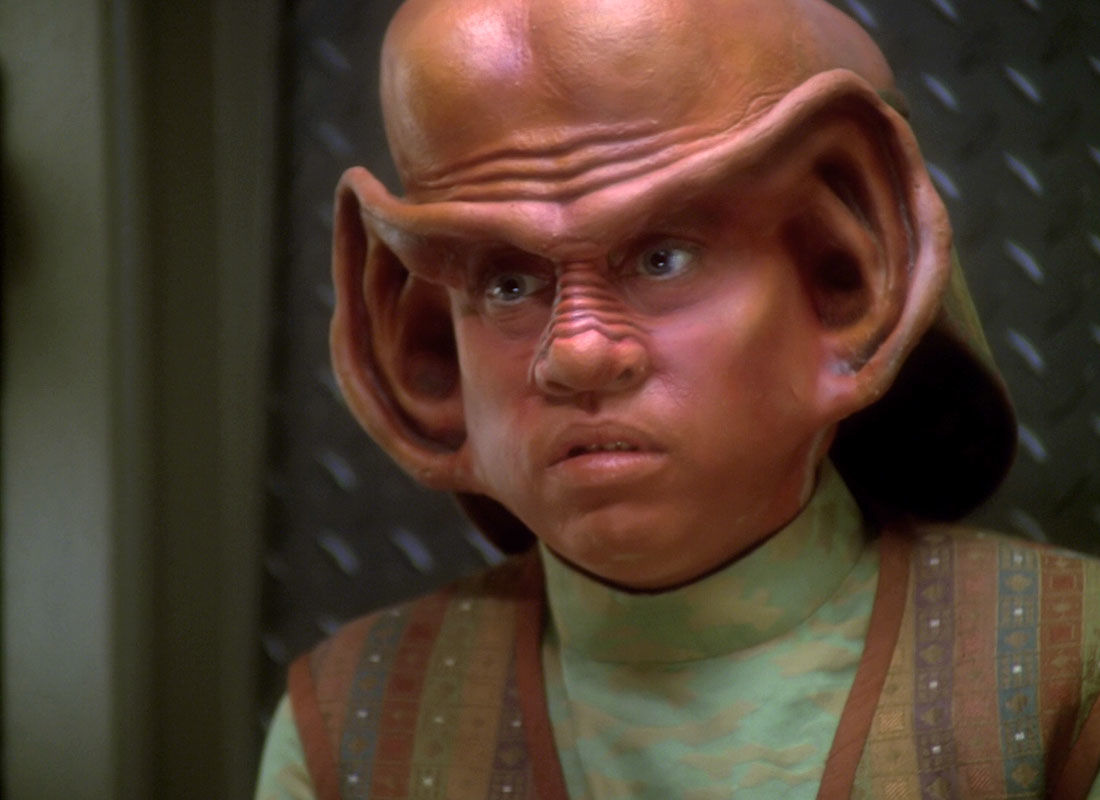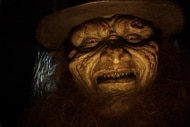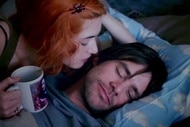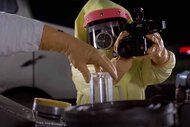Create a free profile to get unlimited access to exclusive videos, sweepstakes, and more!
I'll be seeing you: How Aron Eisenberg's Nog became one of Trek's most aspirational characters

Aron Eisenberg, who played the Ferengi-thief-turned-Starfleet-officer Nog on Star Trek: Deep Space Nine, tragically died on Sunday at the age of 50. It was a shock to a lot of Star Trek fans, and for good reason: Nog was a fan-favorite character for many a DS9 fan, and Eisenberg happily embraced the notoriety that being so closely associated with Trek gave him. He was a fixture at conventions, participated in Star Trek Facebook groups, and even hosted a Trek-centric podcast with his DS9 bestie Cirroc Lofton right up until his passing.
Eisenberg's incredible generosity with his fans and his clear love for the franchise that made him a household name are nothing short of admirable. But there's a part of us that is also mourning Nog, too — a character who hasn't been seen on screen in 20 years. Despite that distance, Nog remains one of the most affecting, aspirational characters in the entire series, and it's no surprise that our feelings of loss extend not just to the man, but to the role he embodied.
Just like Deep Space Nine itself, Nog represented a more realistic, nuanced take on Gene Roddenberry's diverse, utopian vision, seen in crisper colors in the previous two Trek series. He wasn't a static personality, a resolute spouter of technobabble or grandstanding orator. When he started the show, he was a minor supporting character — the scheming nephew of series regular Quark, and a member of Trek's most overtly comic race, the Ferengi. In the early seasons, he was mostly there to be a foil for Lofton's Jake Sisko and the other Ferengi characters — mostly cackling as he blew off school or dragged Jake into one misadventure or another.
But something changed in Season 3's "Heart of Stone" — an episode whose B-plot revolved around Nog prodding Commander Sisko for a recommendation to Starfleet Academy (the kind of place no self-respecting Ferengi would find themselves). When pressed hard enough by Sisko, Nog breaks down and tells the truth; he doesn't want to turn out like his father. He recognizes the faults in the single-minded capitalism of Ferengi society and sees no future for himself in it. In Starfleet, he sees the opportunity to make something of himself, to realize a potential his own people would never let him explore. "I know I've got something to offer. I just need the chance to prove it."
It's a staggering scene, Eisenberg digging out unexpected levels of pathos from that thick Ferengi makeup. His voice, once adorably squeaky, is now terrified, pained. Here, Nog makes a braver choice than we see many of Trek's greatest captains make on screen: He decides to change. In the world of Star Trek, we're shown crews of stalwart, hard-working officers, veterans of years of space exploration and travel, the beneficiaries of a lifetime spent in paradise. But along comes Nog, the product of a toxic and regressive culture that values misogyny, toxic masculinity, and all the worst impulses of capitalism above all else — wanting to be better than that.
True to its penchant for serialized storytelling (a trend that was decidedly rare in science fiction television at that point), Deep Space Nine followed through with Nog's journey. We got to see him gradually grow away from his Ferengi family and toward a career as an engineer, finding a place where his talents and priorities could be cultivated and encouraged. Finally, Nog seemed happier, more mature, freed from the oppressive obligations of his people. Not only were his friends and colleagues proud of him, so were viewers.
Then came one of Nog's greatest challenges: the hardships of war. Throughout the seasons-long conflict of the Dominion War, the casualties were by and large offscreen. But in "The Siege of AR-558," Nog is injured and, despite the advances of Starfleet medical science, has to lose his leg. This results in one of the most harrowing and heartfelt Nog-centric episodes of the series, "It's Only a Paper Moon" — in which a traumatized Nog, now limping with the aid of a bio-synthetic replacement leg, loses himself in the fantasy of Vic Fontaine's holosuite program.
At first, it seems a welcome distraction from the horrors of his injury and his emotional trauma. But eventually we see that Nog is using Vic's casino as a security blanket; he can't bring himself to confront the uncertainties of real life. "If I can get shot — if I can lose my leg — anything could happen to me, Vic. I could die tomorrow," he says. "I don't know if I'm ready to face that."
Looking back, Nog's big scenes from "Heart of Stone" and "It's Only a Paper Moon" are a heart-rending barometer for how much the character (and Eisenberg as a performer) grew over the course of Deep Space Nine's run. In many ways, Nog was the heart of the show, the most vulnerable person on the ship — a young man who worked harder than anyone to escape the circumstances of his upbringing to become someone he could be proud of.
Growing up as the child of a farmer in a small town, I identified deeply with Nog's journey — I wanted something more for myself, something different, to realize my potential. Seeing someone as unexpected as Nog, a grubby kid slumming it in an environment that doesn't see or value his gifts, climb his way toward self-actualization was incredibly inspiring to me. Lots of people wanted to be Captain Kirk or Captain Picard. I wanted to be as brave as Nog.
Rewatching these episodes in the wake of Eisenberg's death, one can't help but be stirred by Vic's advice to Nog before cutting him off from his holosuite addiction: "You've got to play the cards life deals you. Sometimes you win, sometimes you lose. But at least you're in the game."
Eisenberg, who fought through a childhood kidney condition that stunted his growth and a career he constantly thought would come to an end, played the cards life dealt him. And in the eyes of everyone who was ever inspired by Nog's bravery, he absolutely won.














